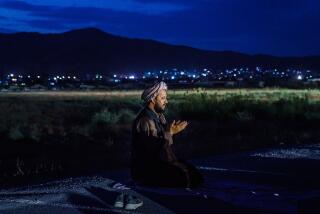Afghan Leader Offers to Share Some Posts
- Share via
MOSCOW — Afghan leader Najib said Tuesday that his ruling party would be willing to share some government posts with rebels who have been fighting his regime for the last seven years.
In listing the possible ministries available to his armed adversaries, however, Najib omitted the Defense Ministry, secret police and Ministry of Internal Affairs--three bodies that play a controlling role in the Afghan government.
He spoke with reporters after holding talks Monday with Soviet leader Mikhail S. Gorbachev and before flying back to Kabul on Tuesday afternoon.
Even the post of premier might be available to the opposition forces, Najib told reporters, but specific allocation of ministries would be subject to negotiation.
Najib, who took power with Soviet backing in May, 1986, revealed little else new in a two-hour session with Soviet and foreign correspondents.
The withdrawal of Soviet troops--estimated by Western diplomats to number at least 115,000--is “inseparably linked” to a halt in support of rebel forces by the United States and other Western European nations, he said.
Asked if he might step down from his leadership position if that were necessary to assure peace, Najib only allowed a tight smile before responding that revolutionaries like himself make decisions based only on the interests of the people and not on personal considerations.
Cease-Fire a Failure?
Najib rejected suggestions that the unilateral, six-month truce that he announced last January as part of a new policy of national reconciliation had been a failure.
About 67,000 refugees who had fled to Pakistan and Iran when Soviet troops arrived at the end of 1979 have returned, he said, and could be regarded as “heroes” for coming back to their homeland.
Western diplomats have estimated that 4 million Afghans left the country after the Soviet invasion in the last days of 1979 that put Babrak Karmal, Najib’s predecessor, into power.
Opponents of Najib, mainly based in Pakistan, have rejected his proposal for a national coalition government, contending they cannot cooperate with a puppet regime while Soviet troops remain in the country.
Najib, however, asked them to reconsider, saying:
“We are ready to share--not symbolically, but in reality--our power.” He listed posts ranging from minister of agriculture and land reform to minister for the state committee on sports that could be filled by his opponents.
As for his meeting with Gorbachev, Najib said that it took place in a very warm atmosphere and added that the Afghan people regard the Kremlin leader as an outstanding champion of peace despite the continuing warfare.
“We love him in our country,” Najib said.
More to Read
Sign up for Essential California
The most important California stories and recommendations in your inbox every morning.
You may occasionally receive promotional content from the Los Angeles Times.













